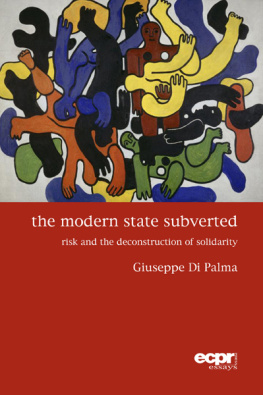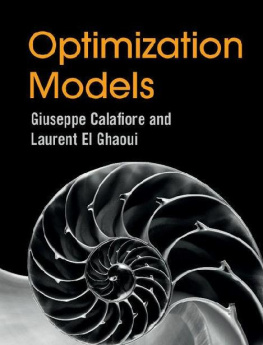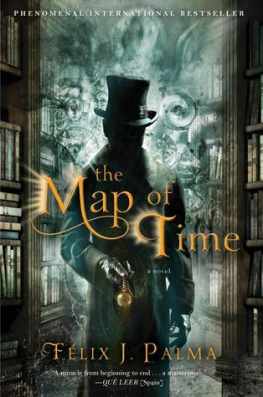Giuseppe Di Palma 2014
Cover Image: Fernand Lger, The Big Black Divers
2013 Artists Rights Society (ARS), New York, ADAGP, Paris
First published by the ECPR Press in 2014
The ECPR Press is the publishing imprint of the European Consortium for Political Research (ECPR), a scholarly association, which supports and encourages the training, research and cross-national co-operation of political scientists in institutions throughout Europe and beyond.
ECPR Press
University of Essex
Wivenhoe Park
Colchester
CO4 3SQ
UK
All rights reserved. No part of this book may be reprinted or reproduced or utilised in any form or by any electronic, mechanical, or other means, now known or hereafter invented, including photocopying and recording, or in any information storage or retrieval system, without permission in writing from the publishers.
Typeset by ECPR Press
Printed and bound by Lightning Source
British Library Cataloguing in Publication Data
A catalogue record for this book is available from the British Library
ISBN: 978-1-907-301-63-6
Kindle ISBN: 978-1-907-301-09-4
PDF ISBN: 978-1-907-301-81-0
www.ecpr.eu/ecprpress
ECPR Press Series Editors:
Dario Castiglione (University of Exeter)
Peter Kennealy (European University Institute)
Alexandra Segerberg (Stockholm University)
Peter Triantafillou (Roskilde University)
ECPR Essays:
From Deliberation to Demonstration: Political Rallies in France, 18681939 (ISBN: 9781907301469) Paula Cossart
Hans Kelsen and the Case for Democracy (ISBN: 9781907301247) Sandrine Baume
Is Democracy a Lost Cause? Paradoxes of an Imperfect Invention (ISBN: 9781907301247) Alfio Mastropaolo
Just Democracy (ISBN: 9781907301148) Philippe Van Parijs
Maestri of Political Science (ISBN: 9781907301193) Donatella Campus, Gianfranco Pasquino, and Martin Bull
Masters of Political Science (ISBN: 9780955820335) Donatella Campus, and Gianfranco Pasquino
ECPR Classics:
Beyond the Nation State: (ISBN: 9780955248870) Ernst Haas
Citizens, Elections, Parties: Approaches to the Comparative Study of the Processes of Development (ISBN: 9780955248887) Stein Rokkan
Comparative Politics: The Problem of Equivalence (ISBN: 9781907301414) Jan Van Deth
Democracy: Political Finance and state Funding for Parties (ISBN: 9780955248801) Jack Lively
Electoral Change: Responses to Evolving Social and Attitudinal Structures in Western Countries (ISBN: 9780955820311) Mark Franklin, Thomas Mackie, and Henry Valen
Elite and Specialized Interviewing (ISBN: 9780954796679) Lewis Anthony Dexter
Identity, Competition and Electoral Availability: The Stabilisation of European Electorates 188 (ISBN: 9780955248832) Peter Mair and Stefano Bartolini
Individualism (ISBN: 9780954796662) Steven Lukes
Modern Social Policies in Britain and Sweden: From Relief to Income Maintenance (ISBN: 9781907301001) Hugh Heclo
Parties and Party Systems: A Framework for Analysis (ISBN: 9780954796617) Giovanni Sartori
Party Identification and Beyond: Representations of Voting and Party Competition (ISBN: 9780955820342) Ian Budge, Ivor Crewe, and Dennis Farlie
People, States and Fear: An Agenda for International Security Studies in the Post-Cold War Era (ISBN: 9780955248818) Barry Buzan
Political Elites: (ISBN: 9780954796600) Geraint Parry
State Formation, Parties and Democracy (ISBN: 9781907301179) Hans Daalder
Territory and Power in the UK: (ISBN: 9780955248863) James Bulpitt
The State Tradition in Western Europe: A Study of an Idea and Institution (ISBN: 9780955820359) Kenneth Dyson
Please visit www.ecpr.eu/ecprpress for up-to-date information about new publications.
Acknowledgements
The story of this book is quickly told. In September 2008, I presented a paper at the annual meeting of the Italian Society of Political Science (SISP), held that year at the University of Pavia. The topic I was invited to deal with was the quality of democracy and its theories; the topic I ended up by dealing with was, in rudimentary form, the quality of democracy before and under neoliberalism. The paper was unfinished, yet already too long for a journal article. A number of colleagues urged me to make it into a book. The paper was in Italian. I decided, as a matter of pride, to write the book in Italian. Variously instrumental in offering precious comments as the volume took shape and in promoting its publication were Marco Almagisti (University of Padova), who had invited me to the Pavia meeting, Paolo Ceri (University of Florence), the late Giorgio Fedel (University of Pavia), Michele Salvati (University of Milano). Last but not least, there was Gianfranco Poggi, who at the time had closed his distinguished international career at the University of Trento. Gianfranco and I had been students together first at Padova, our alma mater, and then at Berkeley and had since remained friends and colleagues, increasingly in contact as we moved toward retirement. Gian was, unsurprisingly for the many who know him, an unstoppable force of nature in promoting publication of the finished book. The book was published by Rubbettino in April 2011 (Viaggio nelle modernit. Rischio sociale e solidariet dallassolutismo al neoliberalismo). A year later, Alfio Mastropaolo (University of Turin), read the book. We knew about each other but we had never met or corresponded. We initiated an ongoing correspondence tous azimuts, which I value as a cherished addition to my life after retirement. Unsolicited, Mastropaolo brought the book to the attention of ECPR Press.
A plain translation of the book was out of the question. In the first place, when I finished the volume for Rubbettino I already knew how I could improve it, if only I had the opportunity to refocus and rewrite. Writing is continuous learning. In the second place, to translate from Italian into English is to discover the enticing siren-like quality of my native language. An English sentence rendered verbatim into Italian sounds pedestrian, but a never-ending convoluted Italian sentence of the type in which I nostalgically indulge rendered verbatim in English reveals why the first ambassadors of early modernity spoke Italian. Thus, the present volume accomplishes three objectives. First, it lifts the veil of ambiguity under which some of my analysis, aided by my Italian, had taken cover. Second, having removed unpersuasive parts of the original, it introduces considerable new material, empirical and analytical, intended to strengthen and better focus what is left of the original. Third, it introduces new topics on justice, criminalisation, and the management of new risks - intended to document in particular the extent to which neoliberalism, contrary to its claims of returning government to the people, micromanages and disciplines individual behaviour.
I close with a note of thanks to our daughter Vittoria. When it came to addressing the rise of discipline in the modern state, Vittoria suggested pairing Max Weber with Michel Foucault. It would have rounded, she argued, my argument that, under modernity, discipline is not just imposed but inscribed in each one of us. She proved convincing. Foucaults analysis of modern conduct as discipline is the object of attention throughout the book.














